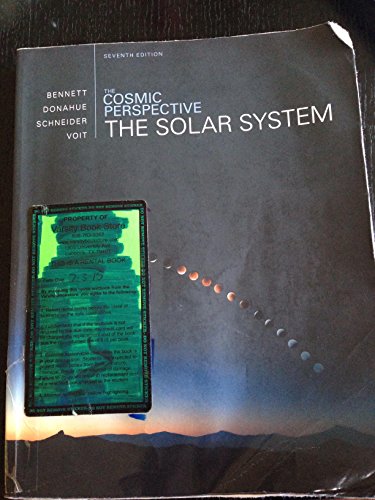032193525X / 9780321935250 Cosmic Perspective, The: The Solar System & MasteringAstronomy with Pearson eText -- ValuePack Access Card -- for The Cosmic Perspective & SkyGazer 5.0 Student Access Code Card Package
Package consists of:
0321765184 / 9780321765185 SkyGazer 5.0 Student Access Code Card (Integrated component)
0321840925 / 9780321840929 MasteringAstronomy with Pearson eText -- ValuePack Access Card -- for The Cosmic Perspective
0321841069 / 9780321841063 Cosmic Perspective, The: The Solar System
Jeffrey Bennett
Jeffrey Bennett holds a B.A. (1981) in biophysics from the University of California, San Diego, and an M.S. and Ph.D. (1987) in astrophysics from the University of Colorado, Boulder. He has taught at every level from preschool through graduate school, including more than 50 college classes in astronomy, physics, mathematics, and education. He served 2 years as a visiting senior scientist at NASA headquarters, where he created NASA’s “IDEAS” program, started a program to fly teachers aboard NASA’s airborne observatories (including SOFIA), and worked on numerous educational programs for the Hubble Space Telescope and other space science missions. He also proposed the idea for and helped develop both the Colorado Scale Model Solar System on the CU-Boulder campus and the Voyage Scale Model Solar System on the National Mall in Washington, D.C. (He is pictured here with the model Sun.) In addition to this astronomy textbook, he has writtenis also lead author of college-level textbooks in astrobiology, mathematics, and statistics (all from Pearson); of critically acclaimed two books for the general public including , On the Cosmic Horizon (Pearson Addison-Wesley, 2001) and Beyond UFOs (Princeton University Press, 2008/2011) and Math for Life (Roberts & Co, 2012); and an of the award-winning series of children’s books that includes Max Goes to the Moon, Max Goes to Mars, Max Goes to Jupiter, and Max’s Ice Age AdventureThe Wizard Who Saved the World. When not working, he enjoys participating in masters swimming and in the daily adventures of life with his wife, Lisa; his children, Grant and Brooke; and his dog, Cosmo. His personal Web site iswww.jeffreybennett.com.
Megan Donahue
Megan Donahue is a professor in the Department of Physics and Astronomy at Michigan State University. Her current research is mainly about using X-ray, UV, infrared, and visible light to study clusters of galaxies: their contents–dark matter, hot gas, galaxies, active galactic nuclei–and what they reveal about the contents of the universe and how galaxies form and evolve. She grew up on a farm in Nebraska and received an S.B.. in physics from MIT, where she began her research career as an X-ray astronomer. She has a Ph.D. in astrophysics from the University of Colorado. Her Ph.D. thesis on theory and optical observations of intergalactic and intracluster gas won the 1993 Trumpler Award from the Astronomical Society for the Pacific for an outstanding astrophysics doctoral dissertation in North America. She continued postdoctoral research as a Carnegie Fellow at Carnegie Observatories in Pasadena, California, and later as an STScI Institute Fellow at Space Telescope. Megan was a staff astronomer at the Space Telescope Science Institute until 2003, when she joined the MSU faculty. Megan is married to Mark Voit, and they collaborate on many projects, including this textbook and the raising of their children, Michaela, Sebastian, and Angela. Between the births of Sebastian and Angela, Megan qualified for and ran the Boston Marathon. These days, Megan runs trails, orienteers, and plays piano and bass guitar whenever her children allow it.
Nicholas Schneider
Nicholas Schneider is an associate professor in the Department of Astrophysical and Planetary Sciences at the University of Colorado and a researcher in the Laboratory for Atmospheric and Space Physics. He received his B.A. in physics and astronomy from Dartmouth College in 1979 and his Ph.D. in planetary science from the University of Arizona in 1988. In 1991, he received the National Science Foundation’s Presidential Young Investigator Award. His research interests include planetary atmospheres and planetary astronomy, with a focus on the odd case of Jupiter’s moon Io. He enjoys teaching at all levels and is active in efforts to improve und
